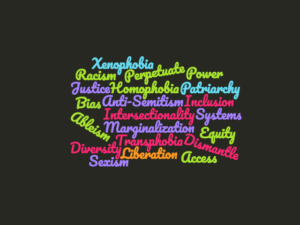 You’ve Tried To Hire Black People & Other People of Color
You’ve Tried To Hire Black People & Other People of Color
You’re a good person. Your organization is run by good people. And you all are doing some good work. But you can do better. Much better. It’s time to become an anti-racist nonprofit.
You are an all or almost all white staff with an all or almost all white board. You’ve tried to hire black people and other people of color, but they never seem to stick around long. Same with your board. You know the organization isn’t perfect but why can’t you seem to create a diverse staff and board? Your organization has good people who don’t say racist things and believe in equality for all. So what seems to be the problem?
It’s Time To Do The Work For Real
You can hire people of color all you want. They aren’t going to stick around. Same with other marginalized groups. As the saying goes, if you really want to create a more diverse team, hire better white people. That doesn’t mean you need to fire everyone and start over. It means the current team needs to do the work so that when you do hire people of color, they are more likely to be happy working at your organization.
What Does It Mean To Do “The Work?”
Racism and other forms of oppression manifest in two different ways: At the individual level and at the systemic level. That means we need to examine racism as it is expressed and experienced by individuals and how it is a part of systems and power structures that sustain and perpetuate racism. Dismantling each of these manifestations of racism is critical. Doing one without the other greatly diminishes the capacity to become an anti-racist nonprofit.
Why Should Your Organization Become An Anti-Racist Nonprofit?
- It’s the right thing to do. Nonprofits are in the business of doing good. Organizations should be role models for justice, fairness, and equity.
- Nonprofits frequently work with marginalized populations.
- People who haven’t done this work cause serious harm through their words and their deeds. That harm is even more significant when in marginalized communities.
- Representation matters.
- As people, we need to see ourselves represented because seeing people who are like us gives us a sense of belonging and of being in the right place.
- People of a specific identity have a more complete understanding of the implications of having that identity. People of color have experiences that allow them to understand the consequences of actions, language, etc., for them in ways that white people miss. Therefore, it is critical to have those voices represented in decision making to avoid causing harm.
- The most innovative organizations are those that are represented by diverse voices. Having people from a wide array of life experiences, and thus perspectives, necessarily results in more creativity, imagination, resourcefulness, and inventiveness.
Why Specifically Anti-Racism Instead Of Other Types of Bigotry?
Frequently, people call this work “diversity” or “equity, diversity, and inclusion.” We do this work specifically through an anti-racism lens because it is one of the most complicated and difficult forms of oppression to dismantle. Those striving to be an anti-racist nonprofit often push aside the racial piece of equity work when faced with a crowded table. People gravitate toward doing the easiest tasks first. We utilize an intersectional perspective that incorporates other forms of oppression such as patriarchy/sexism, ableism, classism, and homophobia.
The facilitation we do is suitable for both white people and people of color, since racism is something that impacts both groups. And we have a team of partners who represent a diverse combination of race, gender, sexual identity, age, socioeconomic class, ability, and more.
The Team
When doing this work with organizations, I partner with experienced consultants who are people of color. (And I am always looking for more folks who are interested in leading these trainings and workshops with me, particularly those who are part of marginalized groups.) We all believe in modeling anti-racism not only in how we work with our clients but also how we work with each other. We believe in the importance of doing excellent work and exceeding the expectations of our clients. However, we also believe in rejecting white supremacy culture in how we work with each other and with our clients. This means we believe in caring for each other and for our clients as human beings. It means we don’t shame anyone, including ourselves, when tasks take a little longer or we need to make space for rest. We know this work takes time and we don’t believe in unnecessary urgency. And we won’t let that way of thinking derail us from doing work with clients that is rooted in deep learning and transformational change.
Prerna Abbi-Scanlon
Prerna is a problem-solving doula, caring for you and your challenge until the right solution is found. She guides clients as they think about how to handle issues related to equity, diversity, and inclusion, and to implement long-lasting solutions rooted in care. She has spent her entire career doing this work, with focus on racial equity, religious diversity, LGBTQ identities, helping different generations to work together productively, and bringing people together on shared values across lines of difference. Prerna’s portfolio of work cuts across sectors, including religious institutions, year of service programming, nonprofits, philanthropy, the corporate sector, and community groups. She is a founding member of Moxie Consultancy Collective, a consultancy run by Black and Brown queer women. Prerna brings a penchant for coaching that makes her an excellent sounding board, teacher, facilitator, and strategic planning partner, and a knack for communication that allows her to help you share your important message.
LaTanya Lane
LaTanya Lane is a facilitator, writer, and performer. She leads trainings and workshops in a variety of professional and community settings, many with a focus on navigating challenges, personal and professional growth, authentic communication, and diversity, equity, and inclusion. LaTanya is a two-time alum of the Voices of our Nations Arts Writers Workshop and winner of the 2018 Diverse Worlds Grant from the Speculative Literature Foundation. LaTanya is a company member with 2nd Story, a Chicago-based storytelling collective. When not working, LaTanya spends her time with her family and friends enjoying adventure and the arts in the Chicago area.
Our Work With Clients
Below is a partial list of the work we are able to provide for clients. If you don’t see what you are looking for, ask us if we do what you need.
We offer 4 major components to this work.
- Organizational assessment to determine the current status of racial equity at the organization
- Workshops to learn about anti-racism that include topics such as
- A review of the history and roots of racism in the United States and how that history impacts us and our organizations today
- Language, terms and concepts from introductory to more advanced
- An exploration of our own ideas about racism and how we have been taught these ideas
- Building accountability
- Facilitating the design and implementation of a process to begin to dismantle systems of racism within the organization that includes clear and specific steps to be taken with end dates, success metrics, and accountability measures
- Strategic planning through a racial equity lens
What Are The Outcomes For This Work?
(Depending on which service offerings are selected)
- A more diverse, equitable, and inclusive organization
- Greater satisfaction for employees, board, volunteers
- Includes more equitable and inclusive hiring/board selection/volunteer recruitment, promotions, and overall treatment of all people
- Greater productivity from staff
- Increased impact among communities served
- More effective communication, both internally and externally
- More effective fundraising
- A better night’s sleep for everyone involved!
If you are ready for your organization to become an anti-racist nonprofit, contact me today.
I can’t wait to work with you toward creating an anti-racist world.


